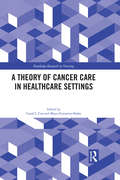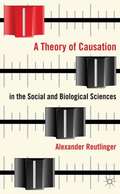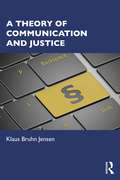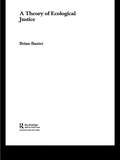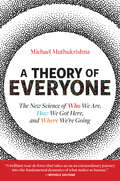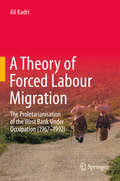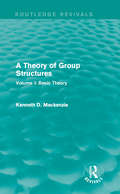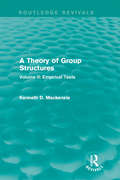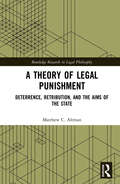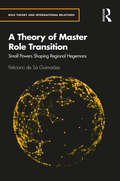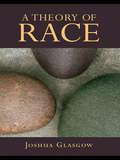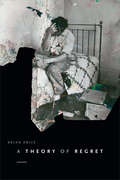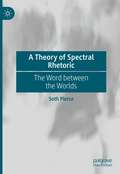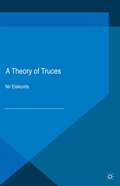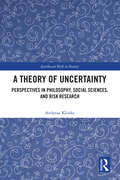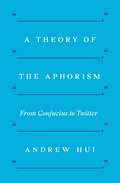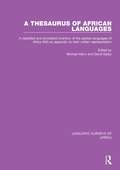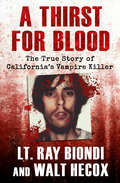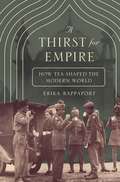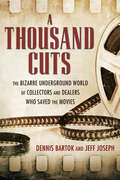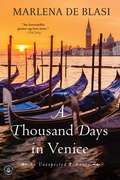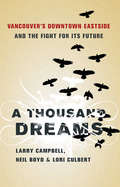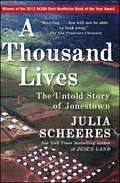- Table View
- List View
A Theory of Cancer Care in Healthcare Settings (Routledge Research in Nursing and Midwifery)
by Carol Cox Maya Zumstein-ShahaThis book provides healthcare professionals with a practice theory for the care and management of patients who have been diagnosed with cancer. It explores what patients experience and how healthcare professionals can assist them in dealing with their uncertainty and fear as well as planning for the future. Unique to the book is its explication of the emerging theory, ‘The Omnipresence of Cancer’, which is set in the context of a discussion of earlier theories also concerned with cancer care. Chapters demonstrate how ‘The Omnipresence of Cancer’ has been developed, validated through research and being further tested in relation to cancer care. In particular, a chapter on philosophical reflections using theory to produce knowledge for practice is included. Each chapter provides essential background, a synthesis of the current state of knowledge, and practice examples associated with cancer care. The combination of theoretical reflection and practice examples is designed to promote comprehension and guidance on implementation of the theory, as well as recommendations for practice. This book will be of significant interest to healthcare students and professionals working in the field of cancer care and oncology, particularly healthcare professionals working in advanced practice roles and nurse educators. It is also anticipated that professionals working in pastoral care, occupational therapy, social work and radiography will be interested in this book.
A Theory of Causation in the Social and Biological Sciences
by Alexander ReutlingerThis first full length treatment of interventionist theories of causation in the social sciences, the biological sciences and other higher-level sciences the presents original counter arguments to recent trends in the debate and serves as useful introduction to the subject.
A Theory of Communication and Justice
by Klaus Bruhn JensenThis book outlines a theory of communication and justice for the digital age, updating classic positions in political philosophy and ethics, and engaging thinkers from Aristotle through Immanuel Kant and the American pragmatists to John Rawls, Jürgen Habermas, and Amartya Sen. In communication seeking to define justice and call out injustice, there is such a thing as the last word. The chapters in this book trace the historical emergence of communication as a human right; specify the technological resources and institutional frameworks necessary for exercising that right; and address some of the challenges following from digitalization that currently confront citizens, national regulators, and international agencies. Among the issues covered are public access to information archives past and present; local and global networks of communication as sources of personal identities and imagined communities; the ongoing reconfiguration of the press as a fourth branch of governance; and privacy as a precondition for individuals and collectives to live their lives according to plans, and to make their own histories. The book will be of interest to students and researchers in media and communication studies, cultural studies, political philosophy and ethics, and interdisciplinary fields examining the ethical and political implications of new information and communication infrastructures.
A Theory of Ecological Justice (Environmental Politics #Vol. 8)
by Brian BaxterIn A Theory of Ecological Justice, Baxter argues for ecological justice - that is, for treating species besides homo sapiens as having a claim in justice to a share of the Earth's resources. It explores the nature of justice claims as applied to organisms of various degrees of complexity and describes the institutional arrangements necessary to integrate the claims of ecological justice into human decision-making.
A Theory of Everyone: The New Science of Who We Are, How We Got Here, and Where We’re Going
by Michael MuthukrishnaA blueprint for a better future that offers a unified theory of human behavior, culture, and society.Playing on the phrase &“a theory of everything&” from physics, Michael Muthukrishna&’s ambitious, original, and deeply hopeful book A Theory of Everyone draws on the most recent research from across the sciences, humanities, and the emerging field of cultural evolution to paint a panoramic picture of who we are and what exactly makes human beings different from all other forms of life on the planet. Muthukrishna argues that it is our unique ability to create culture, a shared body of knowledge, skills, and experience passed on from generation to generation, that has enabled our current dominance. But it is only by understanding and applying the laws of life—the need for energy, innovation, cooperation, and evolution—that we can solve the practical and existential challenges we face as a species. A Theory of Everyone attempts to provide solutions for the most pressing problems of our collective future, such as polarization, inequality, the &“great stagnation&” in productivity, and the energy crisis.Casting a bold and wide net, Muthukrishna&’s book is a must-read for anyone interested in a better future for ourselves and for generations to come.
A Theory of Forced Labour Migration: The Proletarianisation of the West Bank Under Occupation (1967-1992)
by Ali KadriThis book focuses on labour dislocation and migration of Palestinians between 1967 and 1992. In particular, it highlights the social transformations in the occupied Palestinian territory where Palestinian labour was permitted to work in Israel from 1968 onwards. Elaborating on the results of the policy which saw a gradual increase in the number of Palestinian workers commuting daily from a negligible proportion of the actively participating labour force, to 35 percent of all employed persons, and 60 percent of all wage paid workers, the book studies this unique case which embodies characteristics from permanent migration situations not only in the de-jure, but also the de-facto sense; insofar as it embeds higher risks and reallocates resources as if it was a permanent relocation scenario. Illustrated with tables and econometric results, the book identifies the determinants and implications of migrant labour from the West Bank using two broad methodologies: the neoclassical and the historical-structural method. Each of these methods is divided into two branches: the classical divided into price determined and a choice-theoretic framework,and the historical-structural divided into dependency and Marxist theory. In order to gain a comprehensive understanding of the situation, all four perspectives are employed in the investigation. In doing so, what emerges is a structure for the book which takes shape along the different lines of migration literature. The book provides new insights into the making of wage labour and labour migration theory.
A Theory of Freedom
by Shay WelchThis book offers a liberatory conception of individual freedom that uniquely responds to the problems of social oppression and demands of the interrelatedness insofar as it pertains specifically to the social domain of activity.
A Theory of Group Structures: Volume I: Basic Theory
by Kenneth D. MackenzieFirst published in 1976, this A Theory of Group Structures is a study of the aggregation of individuals into groups, which cuts across many different social sciences. Volume one attempts to formulate a more rigorous theory of group structures by providing consistent definitions, assumptions, measures, methodology, theory and results. This book will be of interest to students of all social sciences.
A Theory of Group Structures: Volume II: Empirical Tests
by Kenneth D. MackenzieFirst published in 1976, this A Theory of Group Structures is a study of the aggregation of individuals into groups, which cuts across many different social sciences. Volume two examines a sequence of twelve experiments and reports empirical tests of the theory presented in volume one. The result is a major revision of existing research into problems of group structure and a case study in paradigm development. This book will be of interest to students of all social sciences.
A Theory of Legal Punishment: Deterrence, Retribution, and the Aims of the State (Routledge Research in Legal Philosophy)
by Matthew C. AltmanThis book argues for a mixed theory of legal punishment that treats both crime reduction and retribution as important aims of the state. A central question in the philosophy of law is why the state’s punishment of its own citizens is justified. Traditionally, two theories of punishment have dominated the field: consequentialism and retributivism. According to consequentialism, punishment is justified when it maximizes positive outcomes. According to retributivism, criminals should be punished because they deserve it. This book recognizes the strength of both positions. According to the two-tiered model, the institution of punishment and statutory penalties, as set by the legislature, are justified based on their costs and benefits, in terms of deterrence and rehabilitation. The law exists to preserve the public order. Criminal courts, by contrast, determine who is punished and how much based on what offenders deserve. The courts express the community’s collective sense of resentment at being wronged. This book supports the two-tiered model by showing that it accords with our moral intuitions, commonly held (compatibilist) theories of freedom, and assumptions about how the extent of our knowledge affects our obligations. It engages classic and contemporary work in the philosophy of law and explains the theory’s advantages over competing approaches from retributivists and other mixed theorists. The book also defends consequentialism against a longstanding objection that the social sciences give us little guidance regarding which policies to adopt. Drawing on recent criminological research, the two-tiered model can help us to address some of our most pressing social issues, including the death penalty, drug policy, and mass incarceration. This book will be of interest to philosophers, legal scholars, policymakers, and social scientists, especially criminologists, economists, and political scientists.
A Theory of Master Role Transition: Small Powers Shaping Regional Hegemons (Role Theory and International Relations)
by Feliciano de Sá GuimarãesIn this book, Feliciano de Sá Guimarães offers an original application of Role Theory. He proposes a theory of master role transitions to explain how small powers can change regional powers’ master roles without changing the regional material power distribution.Master role transition is the replacement of an active dominant master role by a dormant or inactive role located within one’s role repertoire. Guimarães argues that only a combination of four necessary conditions can produce a full master role transition: asymmetrical material interdependence, altercasting, domestic contestation and regional contestation. In each one of these conditions, a small power uses material and ideational tools to promote a master role transition within the regional power role repertoire. To test his model, Guimarães turns to five case studies in Latin America, Southern Africa and South Asia: the 2006–2007 Bolivia–Brazil gas crisis, the 2008–2009 Paraguay–Brazil Itaipú Dam crisis, the 2008–2009 Ecuador–Brazil Odebrecht crisis, the 1998 South Africa–Lesotho military intervention crisis and the 1996India–Bangladesh Ganges water crisis.A Theory of Master Role Transition is an excellent resource for those studying both theory and method in International Relations and foreign policy analysis.
A Theory of Race
by Joshua GlasgowSocial commentators have long asked whether racial categories should be conserved or eliminated from our practices, discourse, institutions, and perhaps even private thoughts. In A Theory of Race, Joshua Glasgow argues that this set of choices unnecessarily presents us with too few options. Using both traditional philosophical tools and recent psychological research to investigate folk understandings of race, Glasgow argues that, as ordinarily conceived, race is an illusion. However, our pressing need to speak to and make sense of social life requires that we employ something like racial discourse. These competing pressures, Glasgow maintains, ultimately require us to stop conceptualizing race as something biological, and instead understand it as an entirely social phenomenon.
A Theory of Regret
by Brian PriceIn A Theory of Regret Brian Price contends that regret is better understood as an important political emotion than as a form of weakness. Price shows how regret allows us to see that our convictions are more often the products of our perceptual habits than the authentic signs of moral courage that we more regularly take them to be. Regret teaches us to give up our expectations of what we think should or might occur in the future, and also the idea that what we think we should do will always be the right thing to do. Understood instead as a mode of thoughtfulness, regret helps us to clarify our will in relation to the decisions we make within institutional forms of existence. Considering regret in relation to emancipatory theories of thinking, Price shows how the unconditionally transformative nature of this emotion helps us become more sensitive to contingency and allows us, in turn, to recognize the steps we can take toward changing the institutions that shape our lives.
A Theory of Spectral Rhetoric: The Word between the Worlds
by Seth PierceThis book synthesizes Jacques Derrida’s hauntology and spectrality with affect theory, in order to create a rhetorical framework analyzing the felt absences and hauntings of written and oral texts. The book opens with a history of hauntology, spectrality, and affect theory and how each of those ideas have been applied. The book then moves into discussing the unique elements of the rhetorical framework known as the rhetorrectional situation. Three case studies taken from the Christian tradition, serve to demonstrate how spectral rhetoric works. The first is fictional, C.S. Lewis ’The Great Divorce. The second is non-fiction, Tim Jennings ’The God Shaped Brain. The final one is taken from homiletics, Bishop Michael Curry’s royal wedding 2018 sermon. After the case studies conclusion offers the reader a summary and ideas future applications for spectral rhetoric.
A Theory of Truces (Palgrave Studies in Ethics and Public Policy)
by Nir EisikovitsThis book argues that understanding truces is crucial for our ability to wind down wars. We have paid too much attention to the idea of permanent peace, yet few conflicts end in this way. The book describes how truce makers think, which truces can be morally justified and provides a philosophical history of truce making in the Western tradition.
A Theory of Uncertainty: Perspectives in Philosophy, Social Sciences, and Risk Research (Earthscan Risk in Society)
by Andreas KlinkeUsing sources from classical to modern that broach the phenomenon of uncertainty and its relation to risk, this book creates a novel approach to the recognized but theoretically often unattended issue of uncertainty.Andreas Klinke develops a new, general theory of uncertainty that provides a taxonomy of categories which are deduced from a critical inventory in philosophy, social and natural sciences, and risk research. Comprising six parts, the philosophical grounding of uncertainty sets the stage for the following philosophical and social scientific accounts and explanation of four distinctive guises of uncertainty that form a taxonomic notion and rationale: ontological, epistemological, linguistic-communicative, and teleological uncertainty. The theoretical-conceptual rumination provides a complex, differentiated view of the anatomy of uncertainty and an understanding that can be used in further theoretical and empirical research, as well as socio-political practice. The latter is delineated in the final part addressing the societal domestication of uncertainty.This book will be of great interest to scholars and students in philosophy, social and natural sciences, risk research, as well as inter- and transdisciplinary science fields.
A Theory of the Aphorism: From Confucius to Twitter
by Andrew HuiAn engaging look at the aphorism, the shortest literary form, across time, languages, and culturesAphorisms—or philosophical short sayings—appear everywhere, from Confucius to Twitter, the Buddha to the Bible, Heraclitus to Nietzsche. Yet despite this ubiquity, the aphorism is the least studied literary form. What are its origins? How did it develop? How do religious or philosophical movements arise from the enigmatic sayings of charismatic leaders? And why do some of our most celebrated modern philosophers use aphoristic fragments to convey their deepest ideas? In A Theory of the Aphorism, Andrew Hui crisscrosses histories and cultures to answer these questions and more.With clarity and precision, Hui demonstrates how aphorisms—ranging from China, Greece, and biblical antiquity to the European Renaissance and nineteenth century—encompass sweeping and urgent programs of thought. Constructed as literary fragments, aphorisms open new lines of inquiry and horizons of interpretation. In this way, aphorisms have functioned as ancestors, allies, or antagonists to grand systems of philosophy.Encompassing literature, philology, and philosophy, the history of the book and the history of reading, A Theory of the Aphorism invites us to reflect anew on what it means to think deeply about this pithiest of literary forms.
A Thesaurus of African Languages: A Classified and Annotated Inventory of the Spoken Languages of Africa With an Appendix on Their Written Representation (Linguistic Surveys of Africa #1)
by Michael Mann David DalbyOriginally published in 1987, this thesaurus is concerned with the spoken languages of Africa. Languages are grouped into a relatively large number of sets and subsets within which the relationship of languages to one another is locally apparent and uncontroversial. The volume presents the languages in classified order with notes on each language, their variant names and immediate classification, and reference to the sources consulted. One section offers an exhaustive list of the languages spoken as home languages by local communities in each state, together with details of languages widely used for inter-group communication, given official recognition, or used in education or the media. There are brief phonological analyses of a broad sample of some 20 African languages and a comprehensive bibliography and language index to the whole work
A Third University Is Possible (Forerunners: Ideas First)
by la papersonA Third University is Possible unravels the intimate relationship between the more than 200 US land grant institutions, American settler colonialism, and contemporary university expansion. Author la paperson cracks open uncanny connections between Indian boarding schools, Black education, and missionary schools in Kenya; and between the Department of Homeland Security and the University of California. Central to la paperson&’s discussion is the &“scyborg,&” a decolonizing agent of technological subversion.Drawing parallels to Third Cinema and Black filmmaking assemblages, A Third University is Possible ultimately presents new ways of using language to develop a framework for hotwiring university &“machines&” to the practical work of decolonization. Forerunners: Ideas First is a thought-in-process series of breakthrough digital publications. Written between fresh ideas and finished books, Forerunners draws on scholarly work initiated in notable blogs, social media, conference plenaries, journal articles, and the synergy of academic exchange. This is gray literature publishing: where intense thinking, change, and speculation take place in scholarship.
A Thirst for Blood: The True Story of California's Vampire Killer
by Walt Hecox Lt. Ray BiondiThe &“fast-paced&” inside story of the manhunt for bloodsucking serial killer Richard Chase (Publishers Weekly). Written by the case&’s lead homicide detective, this gripping true crime account details the killing spree of one of California&’s most gruesome murderers: Richard Chase, aka &“the Vampire of Sacramento.&” In January 1978, Sacramento police found the corpse of Teresa Wallin, a loving wife and soon-to-be mother. Veteran detective Lt. Ray Biondi immediately knew the case would be unlike anything he had ever seen before. The victim&’s body was deliberately disfigured in nightmarish ways, and evidence suggested the culprit had collected large volumes of her blood. In less than a month, a two-year-old boy was missing, and two men, another woman, and a five-year-old child dead, their bodies contorted, like Wallin&’s, to fulfill the killer&’s demented sexual desires, and—most disturbingly—his taste for human blood. Previously published as The Dracula Killer, A Thirst for Blood is a riveting report of the investigation, from eyewitness testimonies to the discovery of the crime scenes to Chase&’s interrogation. Lieutenant Biondi and his coauthor, Walt Hecox, provide an unflinching look at the &“vampire killer&” and the cunning police work that finally put an end to his reign of terror. The inspiration for Investigation Discovery&’s Lore: Deadly Obsession and episodes of CSI and Criminal Minds, Chase&’s crimes continue to haunt the world generations later.
A Thirst for Empire: How Tea Shaped the Modern World
by Erika RappaportHow the global tea industry influenced the international economy and the rise of mass consumerismTea has been one of the most popular commodities in the world. Over centuries, profits from its growth and sales funded wars and fueled colonization, and its cultivation brought about massive changes—in land use, labor systems, market practices, and social hierarchies—the effects of which are with us even today. A Thirst for Empire takes a vast and in depth historical look at how men and women—through the tea industry in Europe, Asia, North America, and Africa—transformed global tastes and habits and in the process created our modern consumer society.As Erika Rappaport shows, between the seventeenth and twentieth centuries the boundaries of the tea industry and the British Empire overlapped but were never identical, and she highlights the economic, political, and cultural forces that enabled the British Empire to dominate—but never entirely control—the worldwide production, trade, and consumption of tea. Rappaport delves into how Europeans adopted, appropriated, and altered Chinese tea culture to build a widespread demand for tea in Britain and other global markets and a plantation-based economy in South Asia and Africa. Tea was among the earliest colonial industries in which merchants, planters, promoters, and retailers used imperial resources to pay for global advertising and political lobbying. The commercial model that tea inspired still exists and is vital for understanding how politics and publicity influence the international economy.An expansive and original global history of imperial tea, A Thirst for Empire demonstrates the ways that this fluid and powerful enterprise helped shape the contemporary world.
A Thousand Cuts: The Bizarre Underground World of Collectors and Dealers Who Saved the Movies
by Dennis Bartok Jeff JosephA Thousand Cuts is a candid exploration of one of America's strangest and most quickly vanishing subcultures. It is about the death of physical film in the digital era and about a paranoid, secretive, eccentric, and sometimes obsessive group of film-mad collectors who made movies and their projection a private religion in the time before DVDs and Blu-rays. The book includes the stories of film historian/critic Leonard Maltin, TCM host Robert Osborne discussing Rock Hudson's secret 1970s film vault, RoboCop producer Jon Davison dropping acid and screening King Kong with Jefferson Airplane at the Fillmore East, and Academy Award-winning film historian Kevin Brownlow recounting his decades-long quest to restore the 1927 Napoleon. Other lesser-known but equally fascinating subjects include one-legged former Broadway dancer Tony Turano, who lives in a Norma Desmond-like world of decaying movie memories, and notorious film pirate Al Beardsley, one of the men responsible for putting O. J. Simpson behind bars. Authors Dennis Bartok and Jeff Joseph examine one of the least-known episodes in modern legal history: the FBI's and Justice Department's campaign to harass, intimidate, and arrest film dealers and collectors in the early 1970s. Many of those persecuted were gay men. Victims included Planet of the Apes star Roddy McDowall, who was arrested in 1974 for film collecting and forced to name names of fellow collectors, including Rock Hudson and Mel Tormé. A Thousand Cuts explores the obsessions of the colorful individuals who created their own screening rooms, spent vast sums, negotiated underground networks, and even risked legal jeopardy to pursue their passion for real, physical film.
A Thousand Days In Venice: An Unexpected Romance
by Marlena De BlasiFernando first sees Marlena across the Piazza San Marco and falls in love from afar. When he sees her again in a Venice a year later, he knows it is fate. He knows little English; she, a divorced American chef traveling through Italy, speaks only food-based Italian. Marlena thought she was done with romantic love, incapable of intimacy. Yet within months of their first meeting, she has quit her job, sold her house in St. Louis, kissed her two grown sons good-bye, and moved to Venice to marry "the stranger," as she calls Fernando. This deliciously satisfying memoir is filled with the foods and flavors of Italy and peppered with culinary observations and recipes. But the main course here is an enchanting true story about a woman who falls in love with both a man and a city, and finally finds the home she didn't even know she was missing.
A Thousand Dreams: Vancouver's Downtown Eastside and the Fight for Its Future
by Neil Boyd Larry Campbell Lori CulbertIn this mix of history, journalism, political analysis, and first-person accounts, former chief coroner and Vancouver mayor Larry Campbell, renowned criminologist Neil Boyd, and investigative journalist Lori Culbert, offer a portrait of one of North America's poorest, most drug-challenged neighbourhoods: Vancouver's Downtown Eastside.<P><P>A Thousand Dreams raises provocative questions about the challenges confronting not only Vancouver's Downtown Eastside but also all of North America's major cities and offers concrete, urgently needed solutions, including:Continued support for Insite, the safe injection siteDecriminalization of prostitution and drugsThe transfer of addiction services to the Health Ministry, allowing detox into the medical systemMore government-funded SROs and more affordable social housing
A Thousand Lives: The Untold Story of Hope, Deception, and Survival at Jonestown
by Julia ScheeresIn 1954, a pastor named Jim Jones opened a church in Indianapolis called Peoples Temple Full Gospel Church. He was a charismatic preacher with idealistic beliefs, and he quickly filled his pews with an audience eager to hear his sermons on social justice. As Jones’s behavior became erratic and his message more ominous, his followers leaned on each other to recapture the sense of equality that had drawn them to his church. But even as the congregation thrived, Jones made it increasingly difficult for members to leave. By the time Jones moved his congregation to a remote jungle in Guyana and the US government began to investigate allegations of abuse and false imprisonment in Jonestown, it was too late. A Thousand Lives is the story of Jonestown as it has never been told. New York Times bestselling author Julia Scheeres drew from tens of thousands of recently declassified FBI documents and audiotapes, as well as rare videos and interviews, to piece together an unprecedented and compelling history of the doomed camp, focusing on the people who lived there. The people who built Jonestown wanted to forge a better life for themselves and their children. In South America, however, they found themselves trapped in Jonestown and cut off from the outside world as their leader goaded them toward committing “revolutionary suicide” and deprived them of food, sleep, and hope. Vividly written and impossible to forget, A Thousand Lives is a story of blind loyalty and daring escapes, of corrupted ideals and senseless, haunting loss.
